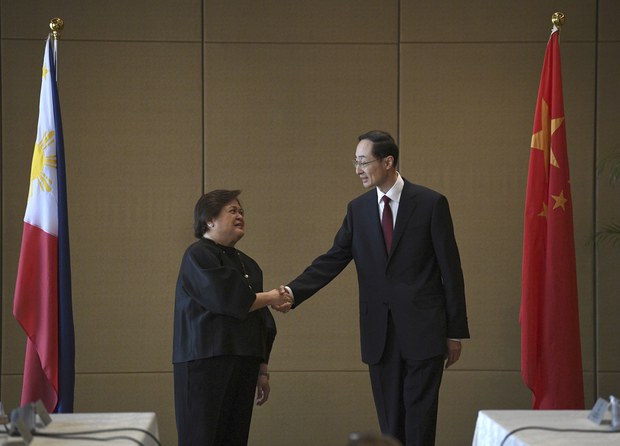Philippines, China in talks over sea dispute, base access for US forces
Share

Ma. Theresa Lazaro (left), the Philippines’ undersecretary for Bilateral Relations and Asian Affairs, shakes hands with Sun Weidong, China’s vice foreign minister, before the start of the Philippines-China Foreign Ministry consultation meeting at a hotel in Manila, March 23, 2023.
China batted on Thursday for friendly negotiations to settle simmering differences, including over the South China Sea and greater access for U.S. troops to Philippine bases, as Manila and Beijing began two days of talks to assess their relationship.
The so-called bilateral “consultative” talks, which have taken place every year since 2016, are the first under Philippine President Ferdinand Marcos Jr.
He has rekindled Manila’s traditionally warm ties with the United States that chilled under his more China-friendly predecessor, and promised Filipinos that he would not abandon “even one square inch” of Philippine territory “to any foreign power.”
Vice Foreign Minister Sun Weidong is leading China’s delegation at the meetings in Manila, while Ma. Theresa Lazaro, undersecretary at the Department of Foreign Affairs, is leading the Philippine delegation.
Sun on Thursday stressed that his government attached “great importance” to the consultations, which are the first since President Ferdinand Marcos Jr. visited China in January.
“We need to keep in the general direction of our friendly relations between our two countries,” Sun said in his opening remarks through an interpreter.
“We will promote the great rejuvenation of the Chinese nation through Chinese modernization and provide new opportunities to the world with our development. And countries in the neighborhood, including the Philippines, will be the first to benefit from such opportunities.”
Manila and Beijing, he said, needed to follow a consensus reached between Marcos and Chinese President Xi Jinping that called for greater cooperation in different fields, when the Philippine leader visited Beijing in January.
“Through these foreign ministry consultations, we hope to translate the outcomes of the state visit into concrete and high impact engagements that are mutually beneficial to our two countries and two peoples,” Undersecretary Lazaro said.
After the first day of the talks focused on how to increase bilateral economic cooperation, diplomats said the second day was expected to focus on territorial disputes. Both countries as well as several Southeast Asian neighbors and Taiwan have overlapping claims in the South China Sea.
The Chinese side on Friday will also likely raise Beijing’s objection to Manila’s recent decision to give the American military expanded access on a rotating basis to bases in the Philippines, amid tensions over Taiwan, according to diplomats.
China’s delegation hoped to have an “in-depth communication on maritime-related issues” on Friday, Sun said.
“We also hope that today’s consultation will lay a favorable atmosphere for tomorrow’s discussions,” he said.
The talks are taking place weeks after Manila protested against a February incident when a Chinese Coast Guard ship allegedly pointed a military-grade laser towards a Philippine Coast Guard vessel in Ayungin Shoal (Second Thomas Shoal).
More recently, Manila also protested what it described as the swarming of more than 40 Chinese fishing boats escorted by a China Coast Guard ship and a People’s Liberation Army (PLA) Navy ship.
In 2016, then-Philippine President Rodrigo Duterte launched the bilateral consultative talks partly as a platform for furthering confidence-building measures in the disputed sea.
During his time in office (2016-22) Duterte ingratiated himself to Xi and worked hard to appease China, which was angered by an international arbitration court’s ruling that invalidated Beijing’s claims to the entire sea region.
In return, China rewarded the Philippines under Duterte with investments and money, even as Beijing continued to insist on its historical ownership of the South China Sea.
BenarNews, an online news service affiliated with Radio Free Asia (RFA), produced this report.







